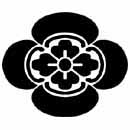MsbLiss posted that her water broke, so I'm under the assumption that she will have her baby in the next few hours. I encourage you to click on her name and wish her a safe birth and a healthy baby.
The white pouch-like item on the left is actually a "safe birth" amulet 安産お守り. Okay, I don't believe in such superstitions, but I figure its always good to be on the safe side. These amulets protect soon-to-be mothers and are usally obtained at Shinto Shrines, but not to miss out on any money-making opportunites, they can also be found at most Buddhist temples. In a country so seemingly secular--far more secular than the US--one finds many references and representations of casual, but still pervasive, religious beliefs.
Anyway, msbLiss, ganbatte!
 Our Family Crest
Our Family Crest
I |
n a previous post, I wrote that my father was the eldest son of the main line of his family of farmer in Fukushima Prefecture. However, once when he thought he might die, back in the late 30s, he overheard his elder sisters squabbling about this property, and in disgust, he relinquished all claims to the property to his younger sister. As such, I am the eldest of the eldest of the main line in name only. Which is fine. I am not a farmer. But with the recent death of my father, I find myself thinking about my responsibilities as the eldest.
This pattern is called a mokkou 木瓜. It was used during the Tang dynasty in China before it ever came to Japan. My mother and father told me a long time ago, that the reason why it's called a mokkou (lit. 木 tree, wood, and 瓜 a kind of melon) is because it looks like a cucumber when sliced. But according to what I have read on the internet, it is actually a representation of a birds nest seen from above. The design is upposed to suggest an abundance of descendents, another way of saying fertility, I guess. This crest was used by none other than Oda Nobunaga, the monkey Shogun. It is also used by every other family in Japan, as well... or so it would seem. There are many families who use this particular crest or a variation of it.
 As I rummaged through my father's things I found a some items bearing this crest: an old notebook, a set of small sake cups. And the meaning of this crest has been on my mind. My father sired three children, two sons and a daughter. I have sired only one daughter, and she lives with her mother in Japan, although she still bears my surname. Am I letting my father down? Am I betraying my ancestors for not siring even one son? This line of questioning may seem silly in this day and age in the US, but like my father, I am at heart a conservative. I believe in change and all the wonders they bring about. But there is also something important about tradition. There is a sense of pride in knowing and understanding whence I came. Okay, so I come from a stock of farmer, no big deal. But I think it might be greater than that. While I am proud to be an American, I am also proud of my Japanese heritage. I'm not just talking about eating sushi and tempura. I enjoy speaking the language, and having participated in a variety of cultural activities representative of this heritage: karate (five years), composing senryu poetry, and of course karaoke. Hahahah.
As I rummaged through my father's things I found a some items bearing this crest: an old notebook, a set of small sake cups. And the meaning of this crest has been on my mind. My father sired three children, two sons and a daughter. I have sired only one daughter, and she lives with her mother in Japan, although she still bears my surname. Am I letting my father down? Am I betraying my ancestors for not siring even one son? This line of questioning may seem silly in this day and age in the US, but like my father, I am at heart a conservative. I believe in change and all the wonders they bring about. But there is also something important about tradition. There is a sense of pride in knowing and understanding whence I came. Okay, so I come from a stock of farmer, no big deal. But I think it might be greater than that. While I am proud to be an American, I am also proud of my Japanese heritage. I'm not just talking about eating sushi and tempura. I enjoy speaking the language, and having participated in a variety of cultural activities representative of this heritage: karate (five years), composing senryu poetry, and of course karaoke. Hahahah.
But I can't help but wonder if perhaps I haven't satisfied my extended family by not providing a son. Oh well, it's too late now... Maybe, someday my daughter will help me deal with this issue by marrying and having a bunch of sons of her own...



No comments:
Post a Comment